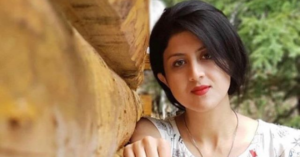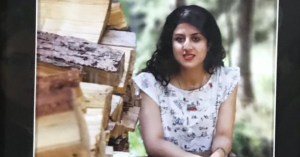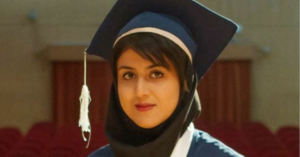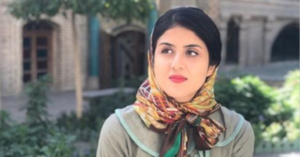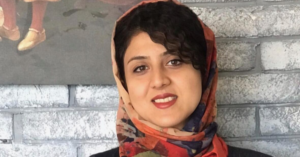Nasim Rahmanifar
N for Nasim: A Brief Story of a “Brain” That Wasn’t Allowed to “Drain”
There is still a pulse of life in the women she painted; the dancing women in red, or the women in white tops who bend over an alleyway from their upstairs window, looking down at something in despair.
Women who whisper to the audience: “Oh, I’ve been wasted.”
Nasim was not wasted. She enjoyed every moment of her brief 25 years of life. She was all happiness, joy and hope, with an extraordinary ability to reach and conquer the peaks. Because her grades were so high, she got onto an MA course without the need for examination. Then the same for a PhD in medical engineering. This was no small feat. Nasim was brimming with intelligence in a society that deadens its brains, a society that considered her half a man for her intelligence. She suffered, and felt lonelier and lonelier. This was why she decided to get her PhD not from Tehran Polytechnic but from Alberta, Canada: migration, for education.
Many years ago Nasim had seen a documentary called The Alberta Legacy. It was about the brain drain. She never thought her time to join the “drain” would come too. But Tehran Polytechnic wasn’t enough for her. It wasn’t hard to secure an offer from Alberta, but it was hard to leave her family. To leave her loved ones, the women she drew and the university she knew.
But Nasim wanted to nurture her talents, for herself. “Not everyone gets this chance. Not in a society where I’ll have no future but domination. I have to leave.” And she did leave.
In her first months in Edmonton, Nasim found out that people laugh in the same way everywhere in the world. People are cruel in the same way, and kind in the same way. There are the looks that follow you: men, women. There are the men who are everywhere. Here, too, there are women in red. Here, too, they dance. Here, too, there are amateurs who claim to be experts in medical engineering or painting. Here, too, people get drunk on the scent of coffee. Nasim never went for a cup of coffee unless she truly desired it. She was an independent woman from a faraway land who didn’t need anyone’s help.
Memories chased her, though. Lost messages on her mobile phone. In her last moments, Nasim remembered one: “Wouldn’t it have been better if you had remained in Iran? You were number one in the national examinations in your own country. What did you swap that for?”
Who would have left her such a message? Was it a government source, or an unfunny joke from a friend? Or a plea from her own wasted talent?
No one knows what Nasim was thinking of when the second missile hit. Maybe the explosion led her beautiful mind to relive the fear of the moment when she received these unknown messages:
Building a case against you (what case?!)
A man with straight hair (what did he want from me?)
Smiles, hands (did they finish?!)
Emojis, fears (did they finish?!)
Tears of joy (joy of what?)
Brain Drain, The Alberta Legacy.
But if so, it all ended very quickly. Her fear-stricken holidays came to an eternal end.
When Nasim came back to Iran after eight months in Canada to see her family, many things had changed. She was a different person now, and was finding herself. In Edmonton everyone talked of research, science and university studies, but her motherland was saturated with news and politics. “It was senseless, leading nowhere. Here it’s all desperation. I had the same desperation back home. Despite all my success.”
“I wanted to go back sooner, especially because the news of war was everywhere. I guessed I might not easily get the chance to return.”
Little did she know they would take from her not only the chance to leave, but the chance to live.
For her mother, Nasim still lives. She is alive. There are still her memories, paintings, grade sheets and praise certificates. Her coffee mug, the women in red that she painted. Her hopes turned to ash, but they still mean something to her mother; Nasim’s hopes were hers too, and her daughter’s success gave her life. In a sense, Nasim was the mother herself. But she had chosen flight instead of oppression: a flight that turned her to ashes. Her mother’s sorrow is what forces her to demand justice. The sorrow is all she possesses to help her daughter, so her death might be as meaningful as her life.

